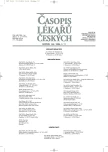-
Medical journals
- Career
Molecular Pathogenesis of Haemophilia A
Authors: D. Habart
Authors‘ workplace: Ústav hematologie a krevní transfuze, Praha
Published in: Čas. Lék. čes. 2005; 144: 727-732
Category: Review Article
Overview
Haemophilia A is one of the most common inherited bleeding disorders. Bleeding phenotype is caused by mutations within factor VIII gene, which result in deficient activity of the factor VIII in plasma. Various genetic defects have been described to affect factor VIII transcription, translation or its amino acid composition. Utilisation of 3D-model of the factor VIII helped to identify amino acid substitutions which adversely affect the protein folding and those which disturb various factor VIII interactions. Genetic defects have been stratified with respect to the relative risk of factor VIII inhibitor formation and a mechanism by which the antibody inhibits its function has been described. The knowledge has been utilised in current diagnostic practice and developement of future therapeutic strategies.
Key words:
haemophilia A, factor VIII, factor VIIIa, factor VIII gene, inhibitor, mutation, von Willebrand factor, factor IXa, tenase.
Labels
Addictology Allergology and clinical immunology Angiology Audiology Clinical biochemistry Dermatology & STDs Paediatric gastroenterology Paediatric surgery Paediatric cardiology Paediatric neurology Paediatric ENT Paediatric psychiatry Paediatric rheumatology Diabetology Pharmacy Vascular surgery Pain management Dental Hygienist
Article was published inJournal of Czech Physicians

-
All articles in this issue
- Two Promising Candidate Genes in the Ethiopathogenesis of DM2 - PPARγ2 and KCNJ11
- Molecular Pathogenesis of Haemophilia A
- Vaginal Infections Screening in Pregnancy
- Effect of n-3 Polyunsaturated Fatty Acids on Plasma Lipid, LDL Lipoperoxidation, Homocysteine and Inflammation Indicators in Diabetic Dyslipidemia Treated with Statin + Fibrate Combination
- Association Between Free Thyroxin Concentration and Degree of Heart Failure in Patients with Chronic Heart Insufficiency
- Irinotecan in Combination with 5-fluorouracil and Leucovorin in the Treatment of Metastatic Colorectal Cancer
- Treatment Results of Langerhans Cell Histiocytosis with LSH II Prot
- Combined Approach to the Treatment of Severe Aortic Stenosis and to Three Coronary Vessel Diseases in Patients with Brain Meningioma and Severe Stenosis of Internal Carotid Artery
- Erythema Nodosum
- 200 let od narození profesora Josefa Škody
- Journal of Czech Physicians
- Journal archive
- Current issue
- Online only
- About the journal
Most read in this issue- Erythema Nodosum
- Vaginal Infections Screening in Pregnancy
- Molecular Pathogenesis of Haemophilia A
- Irinotecan in Combination with 5-fluorouracil and Leucovorin in the Treatment of Metastatic Colorectal Cancer
Login#ADS_BOTTOM_SCRIPTS#Forgotten passwordEnter the email address that you registered with. We will send you instructions on how to set a new password.
- Career

